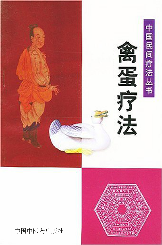
主要责任者: 赵喜新等
责任方式: 主编
出版者: 中国中医药出版社
出版地: 北京
字数: 144 千字
页码: 1-174
开本: 32
中图分类号: R247.1
语种:中
定价:80.00
出版时间:2001-08
丛书多卷书否:是
丛书名:中国民间疗法丛书
书目简介:本册工具书是中国民间疗法丛书之一,共收录96条词条。
| 词条 | 禽蛋疗法 |
| 类别 | 中文百科知识 |
| 释义 |  主要责任者: 赵喜新等 责任方式: 主编 出版者: 中国中医药出版社 出版地: 北京 字数: 144 千字 页码: 1-174 开本: 32 中图分类号: R247.1 语种:中 定价:80.00 出版时间:2001-08 丛书多卷书否:是 丛书名:中国民间疗法丛书 书目简介:本册工具书是中国民间疗法丛书之一,共收录96条词条。 |
| 随便看 |
开放百科全书收录579518条英语、德语、日语等多语种百科知识,基本涵盖了大多数领域的百科知识,是一部内容自由、开放的电子版国际百科全书。